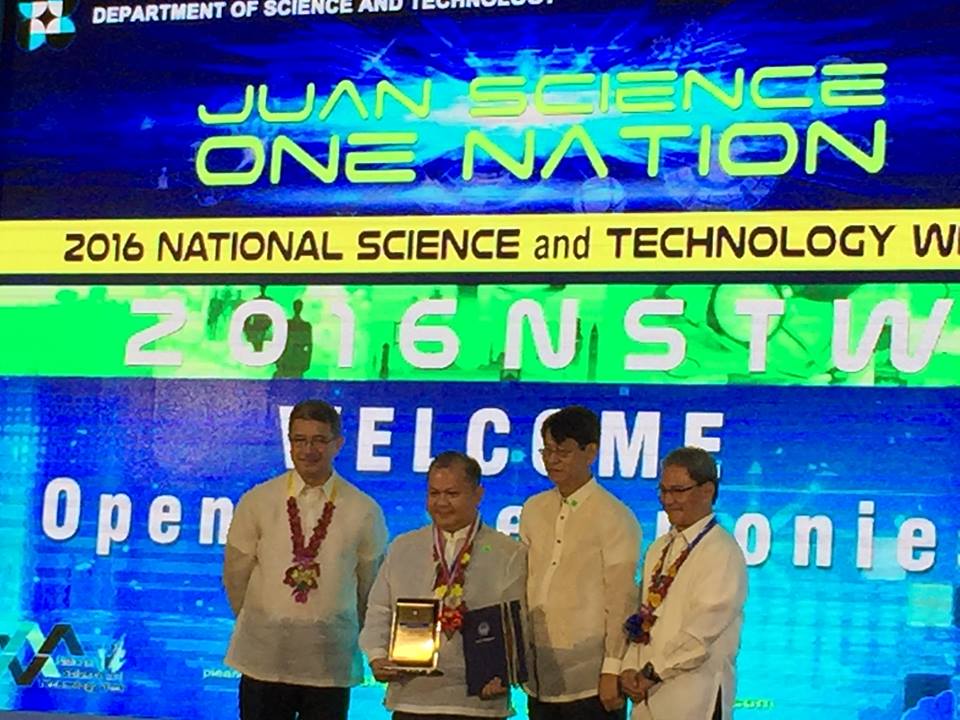Microbiologist vs dengue leads science awardees
A microbiologist who developed a portable kit that can detect within an hour the presence of dengue virus in the blood and a University of the Philippines (UP) professor who used computer programs to develop designer drugs against tuberculosis were among the winners of this year’s National Science and Technology Week (NSTW) Awards.
The five awardees also included an agricultural scientist who researched rice varieties that can adapt to different soil moisture levels, a science administrator who created an enabling environment for UP science researchers and a university scientist whose research on precision food processing can help stakeholders comply with the demand for safe and nutritious food.
Given the Outstanding Technology Commercialization Award was Dr. Raul Destura, while Dr. Junie Billones and Dr. Roel Suralta received the Outstanding Research and Development Award for Basic Research. Dr. Alonzo Gabriel was recognized with a Development Award for Applied Research, while Gisela Concepcion received the Outstanding Science Administrator Award.
At the opening ceremonies of the annual NSTW on Monday, Science Secretary Fortunato dela Peña of the Department of Science and Technology (DOST) gave the five awardees a certificate of recognition, a plaque and the P150,000 cash prize.
Dengue diagnostic kit
The NSTW, celebrated every third week of July since 1993, recognizes the contribution of science and technology to the country’s development and was meant to draw support from public and private institutions for its sustainable development.
Destura was recognized for his successful commercialization of the breakthrough diagnostic kit called Biotek-M Dengue Aquakit that can diagnose dengue within an hour at a more affordable cost. By adding nucleic acid to a blood sample, doctors can detect the presence of the dengue virus when the blood turns green. Uninfected blood turns orange.
The kit was initially tested in 2012 at Rizal Medical Center, National Children’s Hospital and Philippine Children’s Medical Center.
Destura, a microbiologist and an infectious disease specialist who works for the UP Manila National Institutes of Health and the Institute of Molecular Biology and Biotechnology, was the leader of the Lab-in-a-Mug Project, which includes the dengue rapid test kit.
The kit was developed in 2012 as a joint undertaking between the DOST’s Philippine Council for Health Research and Development, Department of Health’s National Epidemiology Center, Biotech-Manila and Philippine Genome Center.
“Such quick testing makes the Philippines one of the first countries in the world to develop this kind of diagnostic device. Biotek-M is likewise as accurate as the currently available Polymerase Chain Reaction technology, yet less costly,” the DOST said.
Designer medications
Billones, a university scientist and professor at UP Manila, received recognition for his pioneering studies that used computer programs to develop a new class of designer medications against tuberculosis, one of the top causes of death in the country.
The DOST said the use of computer programs led to the “swift discovery” of new drugs without the need to perform costly lab experiments.
Suralta, an agricultural scientist at the Philippine Rice Research Institute, was recognized for his outstanding scientific research on rice crops and the flexibility and adaptability of their roots to fluctuating soil moisture conditions, such as drought or flooding.
According to the DOST, Suralta’s breakthroughs and pioneering initiatives in researching rice production in climate change-affected areas are crucial in shaping the future of the country’s rice supply.
Food processing
Gabriel, a full professor and a university scientist at the Department of Food Science and Nutrition at UP Diliman’s College of Home Economics, was cited for his research on precision food processing, which can lead to safer and more nutritious food products.
Concepcion, UP’s vice president for academic affairs, was chosen as this year’s outstanding science administrator for her many accomplishments, which included lobbying for the creation of the UP Diliman-based National Science Complex, and the grant of a heftier funding for master’s degree and doctoral scholarships.
The UP official also simplified the Balik Scientist program to allow Filipino scientists based abroad to return to the UP campuses and enhance their teaching capabilities. Concepcion initiated as well another program that sends faculty members, research and professional staff for short-term training and internships abroad.
“Dr. Concepcion has fostered an enabling environment for researchers in UP by providing university funds, which faculty and researchers use to carry out interdisciplinary and basic or applied research and creative work,” the DOST stated in its citation. TVJ
RELATED STORIES
Davao mayor: Dengue surge ‘disconcerting’
